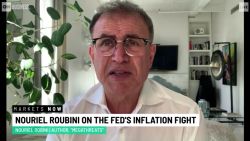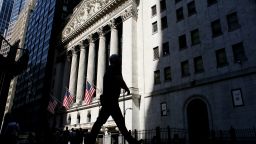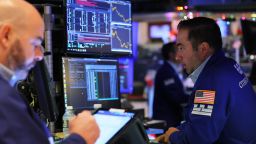A version of this story first appeared in CNN Business’ Before the Bell newsletter. Not a subscriber? You can sign up right here. You can listen to an audio version of the newsletter by clicking the same link.
Investors around the world have been trying to adjust their portfolios to contend with big interest rate hikes from the Federal Reserve, European Central Bank, Bank of England and other central banks this year. But Warren Buffett has no reason to be worried.
It looks like the Oracle of Omaha will have the last laugh this year. Shares of Buffett’s Berkshire Hathaway (BRKB) are up about 5.5% in 2022. The S&P 500 has dropped more than 15%.
Buffett has been helped by the fact that Berkshire has a big stake in oil company Chevron (CVX), which is the best stock in the Dow this year with a nearly 50% gain. Berkshire also owns a huge chunk of Occidental Petroleum (OXY), which has more than doubled…making it the biggest winner in the S&P 500.
Oil stocks have soared thanks to rising crude prices.
Buffett’s affinity for stodgy consumer stocks has also served him well in 2022. Berkshire has big stakes in Coca-Cola (KO) and Kraft Heinz (KHC), which are each up around 10% this year.
Berkshire Hathaway, a massive conglomerate that owns companies ranging from Geico and the Burlington Northern Santa Fe railroad to consumer brands like Dairy Queen, Fruit of the Loom and Duracell, has also held up relatively well during a tumultuous year for the economy and markets.
The company posted a net loss through the first three quarters of 2022 due to the drop in value of other top investments such as Apple (AAPL), Bank of America (BAC) and other financial stocks, but Berkshire Hathaway’s actual business units are doing just fine.
Berkshire Hathaway’s operating profit – the measure that both Buffett and Wall Street analysts prefer to use as a gauge of the company’s health – is up nearly 20%, to $24.1 billion, during the first nine months of the year.
Can Buffett and Berkshire do it again in 2023? More challenges lie ahead as oil prices sink and inflation peaks. That could hurt Berkshire’s own massive energy and utility businesses. Higher interest rates could also continue to put a dent in Berkshire’s banking investments.
Investors will also be looking for Buffett’s lieutenants to be more public about how they plan to run the company in an eventual post-Buffett world. Buffett turns 93 next August while Berkshire vice chair and long-time Buffett confidant Charlie Munger will celebrate his 99th birthday on New Year’s Day.
So it’s fair to wonder how much longer the Warren and Charlie show will go on. Fortunately for Berkshire investors, a succession plan is in place. Vice Chairman Greg Abel will eventually become Berkshire CEO while Buffett’s investing gurus Ted Weschler and Todd Combs will manage the portfolio.
Corporate execs and other insiders not buying the dip
Berkshire has been taking advantage of this year’s market turmoil to scoop up some bargains. Taiwan Semiconductor (TSM) is the latest example. Berkshire has also continued to repurchase its own shares. But many corporate executives don’t seem to be as eager to buy this year’s dip.
According to research from VerityData, only around 5,000 members of management teams have bought shares of their own companies so far this year. That’s down from about 6,500 insiders during the Covid bear market of 2020.
It’s also well below the number of insiders that bought shares of their firms during the Great Recession in 2008 and 2009, the 2011 debt ceiling debacle that led to the US credit downgrade and the pre-presidential election market jitters of 2016.
That could be a bad sign. If CEOs and other C-suite leaders aren’t as confident about a market rebound, should you be?
The lack of insider buying is even more telling when you consider that top CEOs like JPMorgan Chase’s (JPM) Jamie Dimon and David Solomon of Goldman Sachs (GS) have also made cautious comments about the economy as of late.
But Ben Silverman, director of research at VerityData, cautions investors to not get too worried. That’s because insiders also aren’t selling much stock either.
“There seems to be this unwillingness for insiders to call a market bottom,” Silverman said. “But insiders are also not selling or turning stock-based compensation into cash. Many insiders do that regularly. They seem willing to hold on but not to put more skin in the game.”
So it may be the case that CEOs and other corporate insiders are choosing to be cautious. They really aren’t sure where the market and economy are heading, just like the rest of us.
Crypto craziness continues
The stock market turmoil of 2022 is like a fleeting rain shower compared to the raging tempest that’s going on in crypto circles.
Although bitcoin prices have rebounded a bit lately following a dismal November, there are still concerns about the health of other crypto giants, such as Coinbase, in the wake of FTX’s collapse and the arrest of its founder Sam Bankman-Fried.
As my colleague Michelle Toh reports, there are now concerns about big withdrawals from FTX rival Binance, which at one point considered buying/rescuing FTX before changing its mind.
CNN’s Matt Egan also notes that there is growing bipartisan support in Washington for sweeping regulatory changes in the crypto industry. Democratic Sen. Elizabeth Warren has introduced a bill with Republican Sen. Roger Marshall that would crack down on money laundering in the crypto world.




























